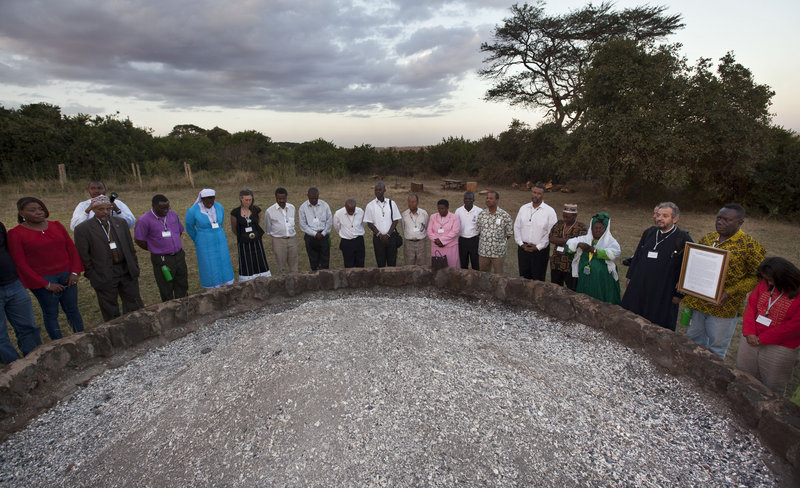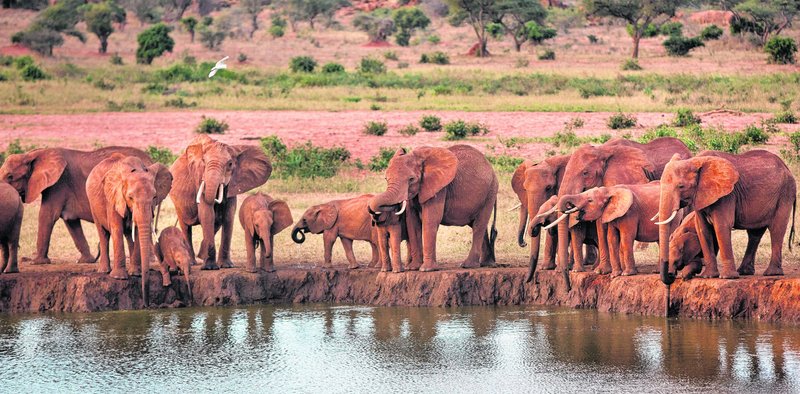NAIROBI, Kenya – Standing before a pile of charred elephant ivory as dusk covered the surrounding savannah, Christian, Muslim and Hindu religious leaders grasped hands and prayed. Let religion, they asked, help “God’s creatures” to survive.
Poachers are escalating their assault on Africa’s elephants and rhinos, and conservationists warn that the animals cannot survive Asia’s high-dollar demand for ivory tusks and rhino horn powder. Some wildlife agents, customs officials and government leaders are being paid off by what is viewed as a well-organized mafia moving animal parts from Africa to Asia, charge the conservationists.
Seeing a dire situation grow worse, the World Wildlife Fund, an animal conservation group, is enlisting religious leaders to take up the cause in the hopes that religion can help save some of the world’s most majestic animals.
“We are the ones who are driving God’s creatures to extinction,” said Martin Palmer, secretary-general of the Britain-based Alliance of Religions and Conservation.
Palmer spoke during Thursday evening’s prayer at a site in Nairobi National Park where Kenyan officials burned hundreds of ivory tusks in 1989 to draw attention to the slaughter of elephants. The park has no elephants, but it hosts 221 rhinos.
“We are the ones who can change the way Africa works,” Palmer said.
Dekila Chungyalpa, the director of the WWF’s Sacred Earth program, argues that the killing of elephants, rhinos and Asian tigers — the animals the WWF is most concerned about — is a moral issue. She said that conservationists are not doing well enough getting the anti-poaching message across, and that new strategies must be tried.
“Faith leaders are the heart and backbone of local communities. They guide and direct the way we think, behave and live our lives,” she said, adding later: “I think this is the missing piece in conservation strategies. … WWF can yell as much as we want and no one will listen to us, but a religious leader can say, ‘This is not a part of our values. This is immoral.’“
Three dozen religious leaders from nine African countries toured Nairobi National Park on Thursday, where they saw rhinos, zebras, buffalo and ostriches, all within site of the skyline of Kenya’s capital city.
One of the safari vans held a Christian, a Hindu, a Muslim and a Buddhist.
Hamza Mutunu, a Muslim leader from Tanzania, argued for the animals.
“The general message is that taking care of the wildlife is part and parcel with our religion,” he said. “We have a duty from the Prophet Mohammed.”
Preetika Bhanderi, who is with the Hindu Council of Africa, said: “Hindu’s backbone is non-violence toward everything that has life. That means animals, and people, of course.”
The Rev. Charles Odira, a Catholic priest from Kenya, said religious leaders can help spread the message effectively given the moral authority and standing they have in African communities.
“Just as when we talk about Jesus Christ, when we say (from the pulpit) that animals are part of God’s community, an impact will be made,” he said.
Chungyalpa compared the effort to enlist religious leaders in the anti-poaching fight to how religious pressure helped end apartheid in South Africa.
“There has to be a rising up of moral outrage,” she said. “This is the spirit we’re after.”
Copy the Story Link
Send questions/comments to the editors.




Success. Please wait for the page to reload. If the page does not reload within 5 seconds, please refresh the page.
Enter your email and password to access comments.
Hi, to comment on stories you must . This profile is in addition to your subscription and website login.
Already have a commenting profile? .
Invalid username/password.
Please check your email to confirm and complete your registration.
Only subscribers are eligible to post comments. Please subscribe or login first for digital access. Here’s why.
Use the form below to reset your password. When you've submitted your account email, we will send an email with a reset code.